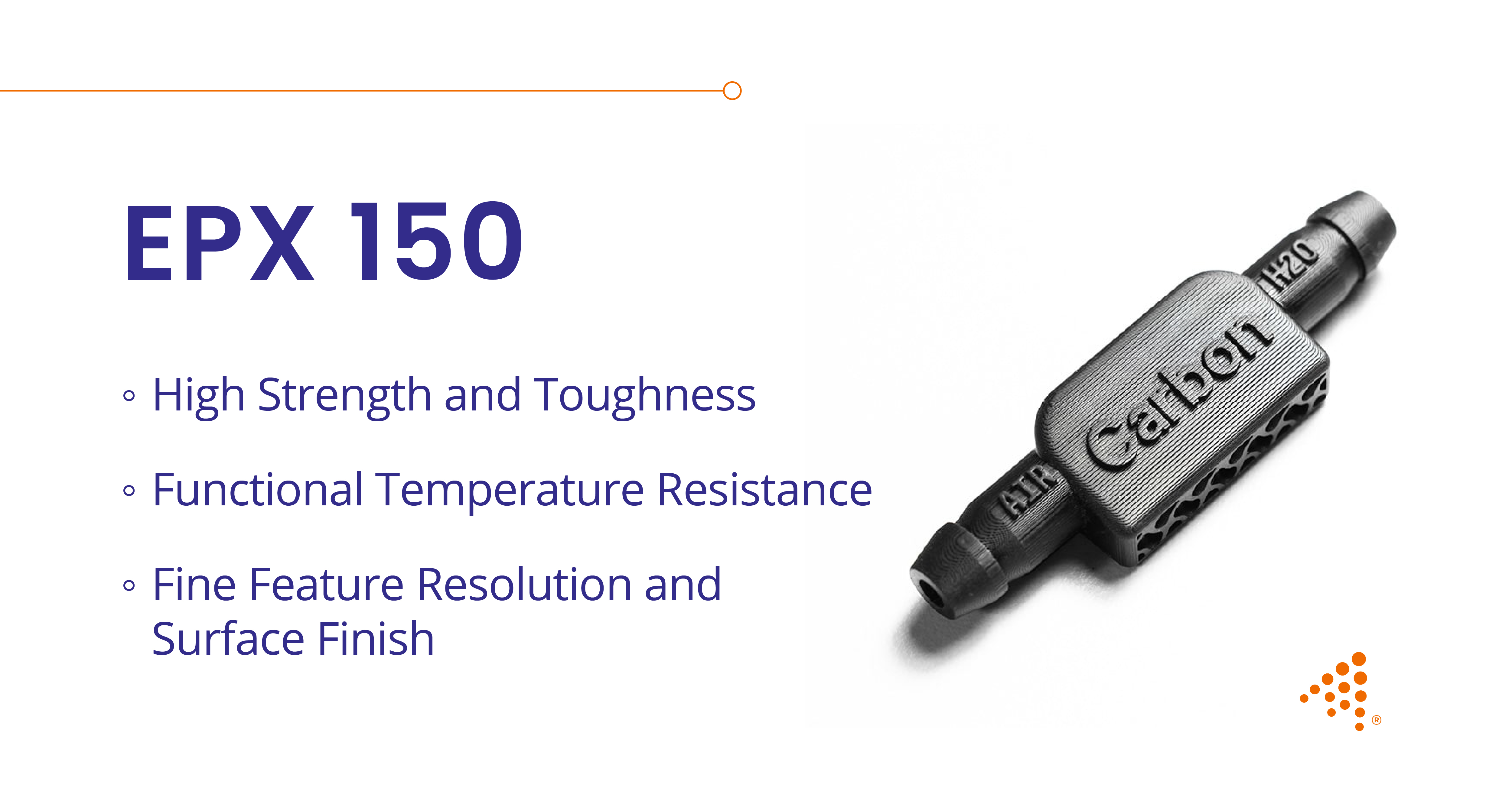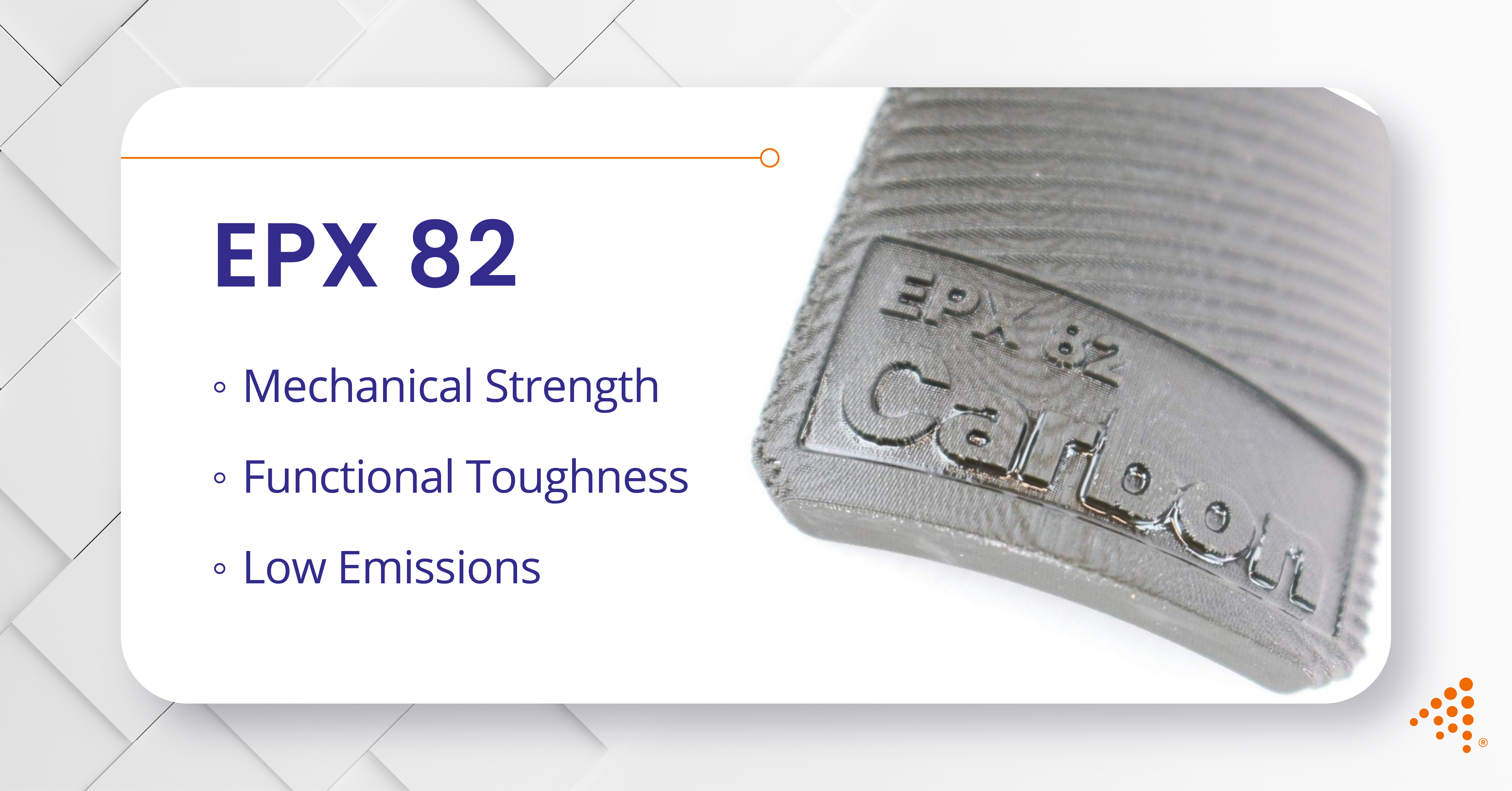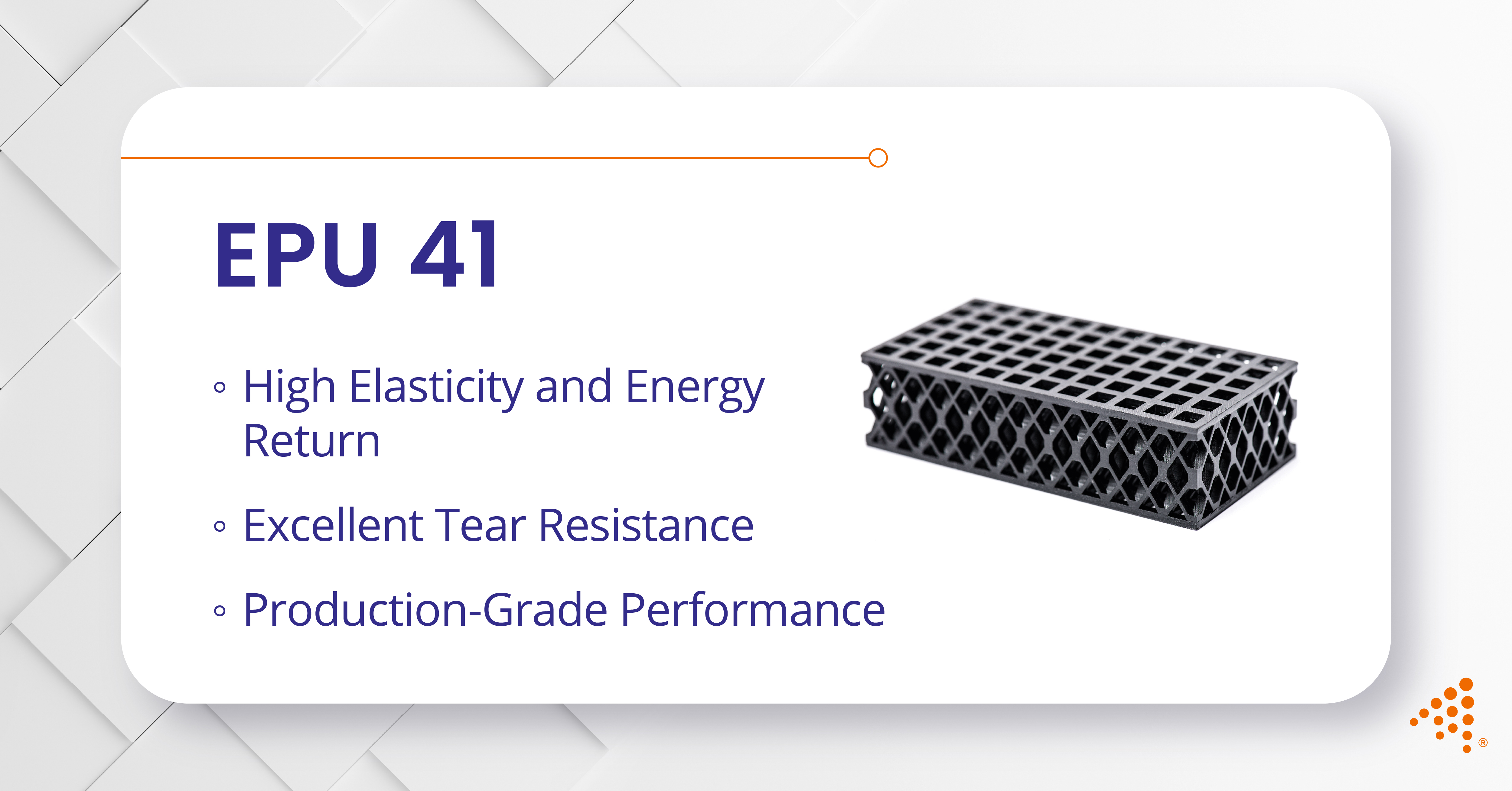EPX 86FR: Flame-Retardant Resin with Exceptional Performance
In manufacturing medical devices and electronics, the materials used must meet stringent safety and performance standards. For components that...
4 min read
Nick Erickson : May 30, 2025 8:13:00 AM

EPX 150 is an advanced, rigid epoxy-based engineering resin developed by Carbon and purpose-built for additive manufacturing services that demand high-performance outcomes. Known for its excellent mechanical strength, thermal resistance, and toughness, this material is increasingly being used for end-use components in sectors such as automotive, medical devices, and industrial manufacturing.
Comparable to high-performance thermoplastics like PEEK and PSU, EPX 150 enables design for additive manufacturing (DfAM) by supporting complex geometries and tight tolerances that are typically difficult to achieve using traditional injection molding—especially in low-volume production scenarios or highly customized applications.
Read More About Injection Molding Defects: Discoloration – Why It Happens and How to Avoid It
EPX 150 is distinguished by a set of properties that make it suitable for robust functional parts across various industries, including those with stringent requirements.
EPX 150 exhibits notable mechanical properties, including an Ultimate Tensile Strength of 76 MPa (11 ksi), a Tensile Modulus of 2700 MPa (392 ksi), a Notched Impact Strength of 36 J/m (0.67 ft-lb/in), and an Elongation at Break of 5%. This allows it to endure significant stress and absorb impacts without fracturing, making it reliable for functional components that experience dynamic loads. Its inherent toughness ensures parts maintain their integrity under demanding conditions.
The material demonstrates excellent performance at elevated temperatures. It has a Heat Deflection Temperature (HDT) of 155°C (311°F) after thermal post-cure. EPX 150 is recommended for long-term use at temperatures ranging from -30°C to 125°C (-22°F to 257°F) and shows excellent retention of material properties during high-temperature aging, temperature/humidity cycling, and thermal shock. This enables EPX 150 parts to function effectively in environments with significant heat exposure.
EPX 150 can withstand over 400 cycles of 134°C (273°F) / 4-minute steam with minimal degradation, making it ideal for reusable medical devices. Its compliance with steam sterilization requirements supports its use in DFM for medical devices like surgical trays and guides.
Parts produced with EPX 150 using processes like Carbon DLS Prototyping (Digital Light Synthesis) typically exhibit isotropic mechanical properties. This means the material's strength and stiffness are consistent in all directions (X, Y, and Z axes), which is a significant advantage over some other additive manufacturing techniques where properties can vary depending on print orientation. This uniformity is crucial for predictable performance in critical parts.
EPX 150 offers robust resistance to a variety of common industrial and medical chemicals. It can withstand long-term, high-temperature exposure to substances including water, water/glycol mixtures, common medical disinfectants, and pH 2-12 buffers, showing minimal change in tensile properties. This characteristic contributes to the longevity and reliability of manufactured components in challenging chemical environments.
When processed using compatible additive manufacturing solutions, EPX 150 can achieve fine feature details and a relatively smooth surface finish. This reduces the need for extensive post-processing and allows for the creation of intricate designs, which is beneficial for components requiring precision.
Partner with us to bring your designs to life using EPX 150 and our cutting-edge additive and injection molding capabilities.
The robust nature and balanced properties of EPX 150 lend it to a variety of demanding functional uses, from prototyping to end-use part production, especially where mechanical integrity, chemical inertness, and thermal stability are key.
Due to its strength, high-temperature resistance, and ability to be molded into complex shapes with fine features, EPX 150 is frequently employed for sealed electrical connectors, sensor housings, and enclosures for electronic components. These parts often require durability and stability in varying environmental conditions.
In the automotive sector, EPX 150 is used for under-hood components, automotive T3 connectors, brackets, and covers that require good thermal performance and resistance to automotive fluids. Its toughness is also beneficial for parts that might experience vibration or minor impacts.
The material's durability and strength make it suitable for manufacturing custom jigs, fixtures, fluid spray nozzles, and tooling aids used in assembly lines and other industrial settings. These components help improve manufacturing efficiency and can be produced quickly and on-demand. The process of creating these tools can be faster than traditional machining or even some forms of rapid injection molding.
EPX 150 can be found in consumer electronic devices requiring robust internal components or durable external casings. Its ability to produce parts with good aesthetics and mechanical stability makes it a valuable option in this sector.
Given its excellent steam sterilizability and robust mechanical properties, EPX 150 is well-suited for reusable medical devices like surgical guides and trays. This offers a route for producing customized and repeatedly sterilizable medical products that are both durable and precise, presenting an advanced alternative or complement to traditional medical injection molding materials for specific, high-performance needs.
Read More About Guide to Polypropylene (PP): A Versatile Material for Manufacturing
Despite its many advantages, EPX 150 has certain limitations that engineers and designers should consider, particularly when evaluating it against other materials or manufacturing processes.
EPX 150, along with the specialized additive manufacturing equipment required to process it (like Carbon DLS systems), can represent a higher per-part cost compared to some traditional high-volume manufacturing methods, especially for very large quantities of simpler parts. The cost-effectiveness is often found in its ability to produce complex geometries without tooling, for custom parts, or in bridge-to-production scenarios.
While EPX 150 offers excellent temperature resistance for a polymer with its HDT of 155°C (311°F), it is not suitable for applications involving extremely high temperatures where specialized ceramics or ultra-high-temperature polymers would be necessary. Its thermal performance, though robust for an epoxy, has an upper limit.
Although EPX 150 is designed for toughness and impact resistance, with an elongation at break of 5%, some highly ductile thermoplastics (like unfilled nylons or polypropylenes often used in injection molding) might offer superior elongation or performance in extreme impact scenarios where significant yielding is preferred.
Whether you need DfAM, DfIM, or ISO-certified manufacturing, we provide comprehensive design for manufacturing services and tooling solutions tailored for your application.
Choosing EPX 150 is often driven by its compelling combination of mechanical toughness, high functional temperature resistance, excellent chemical resistance, and its ability to be repeatedly steam sterilized. It serves as an outstanding material for producing end-use parts that need to be strong, durable, and capable of performing in demanding thermal and chemical environments, including reusable medical applications.
EPX 150 allows for the creation of complex, intricate parts with fine features and tight tolerances that would be difficult or impossible to produce using traditional subtractive methods or might require expensive and time-consuming tooling for injection molding, especially for low to medium volume production runs or highly customized components. Its isotropic properties are a significant advantage, ensuring predictable performance regardless of part orientation during its build. For companies needing robust functional prototypes, manufacturing aids, or end-use components in the automotive, industrial, and medical device sectors, EPX 150 offers a modern solution to complex engineering challenges.
You can also view our Material Selection tool.

In manufacturing medical devices and electronics, the materials used must meet stringent safety and performance standards. For components that...

Epoxy 82 (EPX 82) is a high-performance, rigid photopolymer resin developed by Carbon for its Digital Light Synthesis™ (DLS™) technology. This...

Elastomeric Polyurethane (EPU 41) is a versatile, production-grade additive manufacturing resin developed by Carbon. It is engineered to deliver...